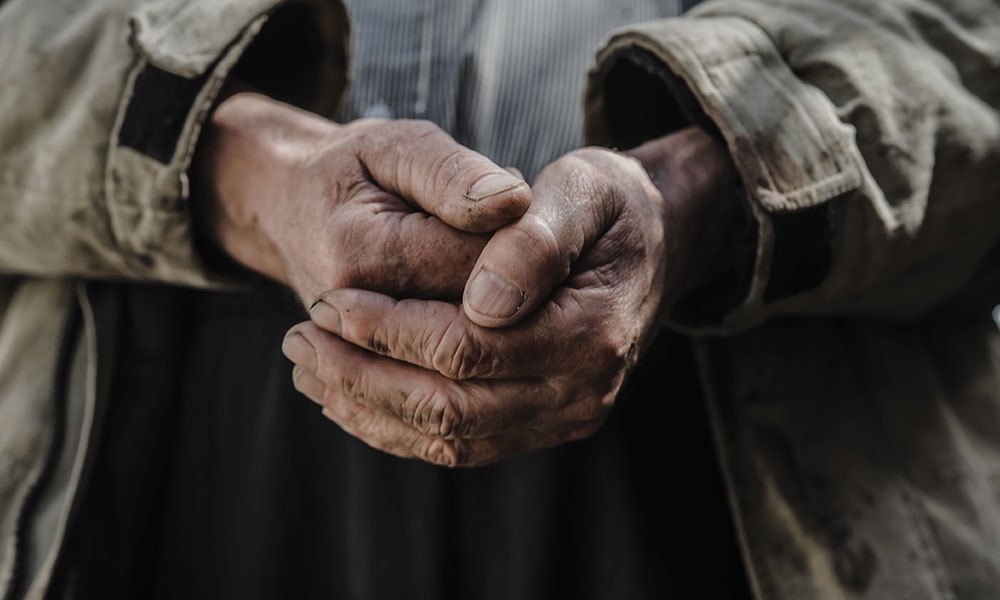
Option for the Poor and Vulnerable
Catholic Social Teaching emphasizes the equal dignity and value of every human person. However, when it comes to the poor and vulnerable, a clear preference is expressed. As the United States Conference of Catholic Bishops (USCCB) states on its website, “our tradition … instructs us to put the needs of the poor and vulnerable first.”
A scriptural basis
The Scriptures provide a clear foundation for the preferential option for the poor and vulnerable. Throughout the Old Testament, God repeatedly calls the Israelites to look after the widow and the orphan, as well as the foreigners in their land (see Dt 27:19, for example). God consistently takes the side of those who are oppressed, and calls his people to do likewise.
In the New Testament, Jesus summarizes the teaching of the Old Testament by giving the Golden Rule: “Do to others whatever you would have them do to you.” (Mt 7:12; Lk 6:31) On the surface, this would seem to maintain Catholic Social Teaching’s emphasis on equal dignity and value.
However, further basis for the preferential option for the poor emerges when we learn of the still more profound reason for honoring the Golden Rule. In the Gospel of Matthew (25:31-46), we are taught quite explicitly that whatever we do or do not do for the least members of society, we do or do not do for Jesus. Most strikingly, Jesus reveals that this will be the criteria upon which we are judged at the final judgment.
Interestingly, in the New American Bible, this teaching of Jesus is found under the heading, “The Judgment of the Nations.” This signifies the stakes are not merely individual, but collective. The USCCB explains that the moral status of a society is determined at a basic level by how its poorest and most vulnerable members are faring. And so, the principle of the preferential option for the poor is a concern not only for us as individuals, but for us as a society.
The universal destination of goods
The preferential option for the poor and vulnerable is also grounded in the Church’s teaching on the universal destination of goods. The Church upholds the right to private property and other forms of private ownership of goods because these provide an environment in which a person can exercise personal and family autonomy. This, in turn, stimulates the exercise of responsibility, which is essential for civil liberty. (Compendium of the Social Doctrine of the Church, 176) So, private ownership of property and goods helps ensure “a correct social order.”
However, the Church’s social doctrine requires that everyone must have equal access to ownership of goods. Consequently, the right to private property is not absolute. The Compendium (177) continues, “the right to private property is subordinated to the right to common use, to the fact that goods are meant for everyone.” This principle of the universal destination of goods is not opposed to the right to private property. Rather, it reminds us that private ownership of goods is not an end, but a means to respecting the universal destination of goods.
The universal destination of goods, then, “entails obligations on how goods are to be used by their legitimate owners.” (178) Individuals are not free to use their privately-owned resources any way they choose. They must consider the effects a particular use will have so that it benefits the common good, not just themselves and their family. Moreover, this principle requires that the poor and vulnerable are given “a special form of primacy in the exercise of Christian charity.” (182) In 1984, St. John Paul II expressed it this way during his an apostolic visit to Canada:“The needs of the poor take priority over the desires of the rich.” (5)
Did You Know …
In 1986, the United States Conference of Catholic Bishops issued a pastoral letter titled Economic Justice for All. The pastoral letter was significant because it sought to apply Catholic Social Teaching to the United States economy. It offered a moral framework to address issues like poverty, employment and international development.
Here is a quote from the letter on the preferential option for the poor and vulnerable: “As individuals and as a nation, therefore, we are called to make a fundamental ‘option for the poor’. The obligation to evaluate social and economic activity from the viewpoint of the poor and the powerless arises from the radical command to love one’s neighbor and one’s self. Those who are marginalized and whose rights are denied have privileged claims if society is to provide justice for all. This obligation is deeply rooted in Christian belief.” (87)
Scriptures on the poor
“Open your mouth in behalf of the mute, and for the rights of the destitute; Open your mouth, judge justly, defend the needy and the poor.” Prv 31:8-9
“My child, do not mock the life of the poor; do not keep needy eyes waiting. Do not grieve the hungry, nor anger the needy.” Sir 4:1-2
“If someone who has worldly means sees a brother in need and refuses him compassion, how can the love of God remain in him?” 1 Jn 3:17
Doug Culp is the chief operating officer for the Pontifical Mission Societies of the United States.



